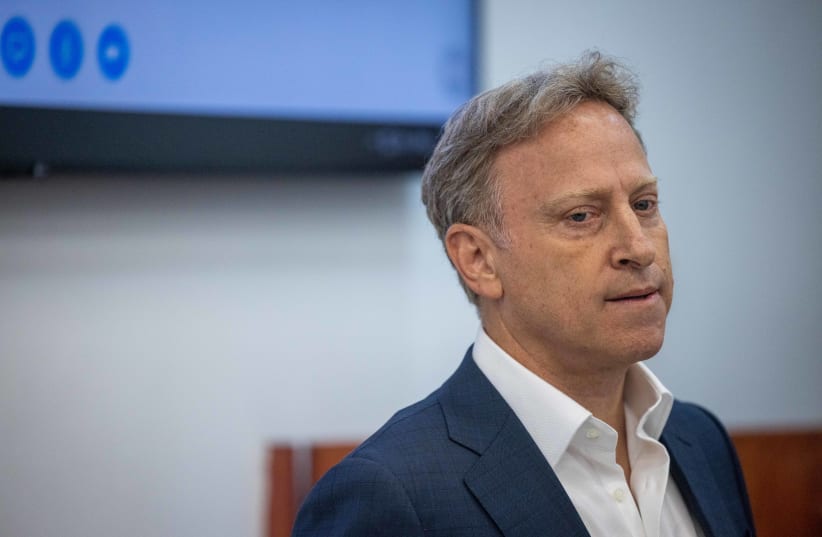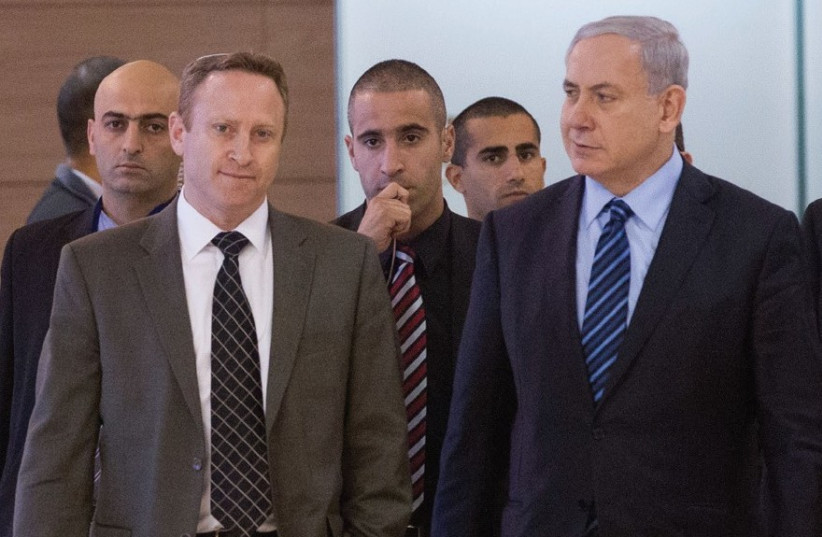Prime Minister Benjamin Netanyahu feared that without an agreement with media mogul Arnon Mozes, he would lose the 2015 Israeli election, Netanyahu’s former chief of staff Ari Harow testified during his first day at the stand as state’s witness at the Jerusalem District Court on Tuesday.
The American-born Harow testified on Case 2000, the Yediot Aharonot-Israel Hayom Affair, which alleges that Netanyahu sought to weaken a competitor of a paper in return for positive coverage.
“If we reach an agreement with [Yediot Aharonot publisher Mozes] we’ll win the election,” the prosecution relayed a statement by Netanyahu that Harow told police investigators.
However at another point in his testimony, Harow said that Netanyahu and his lawyer had discussed that they didn’t want to create the appearance of a quid pro quo after a meeting with Mozes. Netanyahu's attorney and relative David Shimron allegedly advised how to avoid such an impression.
The prosecution doesn’t feel that this harmed the case, as Netanyahu allegedly knew he was being recorded at the time, by Harow at the direction of the prime minister. Netanyahu allegedly related to Harow that he felt that Mozes was recording some of their meetings as well. Two of the prime minister's meetings with Mozes were recorded by Harow, once by placing the phone in Netanyahu's jacket pocket, but the recordings weren't utilized by the prime minister.
The former chief of staff said that in 2008 there were several meetings with Netanyahu and Mozes, who the Israeli leader described as the main source of media antagonism against the Likud leader. As chief of staff in 2014, Harow had organized six meetings in the latter part of the year.
Mozes and Netanyahu held meetings at the prime minister’s house, according to Harow, because it was the only place they could “meet discreetly,” to talk. The witness claimed that the meetings didn’t appear on the prime minister’s schedule.
Harow felt that in one 2014 meeting Netanyahu wanted to lower Mozes’s hostility prior to the election and the Yediot Aharonot publisher wanted to discuss competitor Yisrael Hayom. To Mozes’s chagrin, Yisrael Hayom was releasing a weekend paper, Harow explained. He alleged that Mozes wanted to reach an understanding with Netanyahu on the “Yisrael Hayom Law.” The two allegedly discussed an outline similar to the bill, according to testimony.
The Yisrael Hayom Law, as it became known, didn’t explicitly name the newspaper, but in effect it would have only targeted Yisrael Hayom and would restrict its ability to provide free newspapers six days a week.
Later, while a law was being discussed in the Knesset, Harow was asked by Netanyahu to pass a message to Mozes. Harow said that he had an aide record a call between himself and Mozes in which he agreed to contact Labor MK Eytan Cabel, who initiated the bill, who would then speak to now-justice minister Yariv Levin. Harow said that he understood that this was a follow up to past correspondence, and that the sentiment was that both sides were doing as they expected of one another.
Harow's relationship with Netanyahu spans for years
The Knesset vote for the Yisrael Hayom Law was later postponed, and Harow said that Netanyahu discussed with colleagues how it would be impossible to pass the law before the election.
According to Harow, Netanyahu had attempted to facilitate the sale of Yedioth to an owner more sympathetic and ideologically aligned. Harow allegedly was asked by Netanyahu to organize sales meetings with Mozes to several businessmen, including Australian businessman James Packer. Business tycoon Arnon Milchan was another option.
Harow also gave testimony on Case 1000, also known as the Gifts Affair. He detailed how Milchan had left cigars for Netanyahu in his study, and put champagne in the kitchen.
At a meeting, Milchan allegedly requested that Netanyahu speak to US Secretary of State John Kerry about a visa issue. The defense argued that the prosecution's line of questioning didn't connect the items to the request. Harow said he remembered a call in which Netanyahu had brought the issue up with Kerry.
Harow had trouble recalling specific details during the testimony, and often had to be reminded by the prosecution what he had told police investigators. Many times he spoke to generalities and sentiments, rather than exact words.
The former chief of staff's cross-examination is set to continue Wednesday and may last several days -- but may be interrupted by former UN ambassador Gilad Erdan's projected May 15 testimony.
Netanyahu and Harow first met in 2002, the witness recalled, and said in 2007 he was asked to join his team.
"I worked very close to Prime Minister Netanyahu," he said of his past positions.
In 2008 he took the role first as Netanyahu’s bureau chief, working on English and international affairs, then returned as his chief of staff in 2014, and finally served as Likud 2015 election campaign manager.
Harow faced his own fraud and breach of trust charges, but made a plea bargain to testify against Netanyahu. Harow will serve six months of community service and pay a NIS 700,000 fine.

